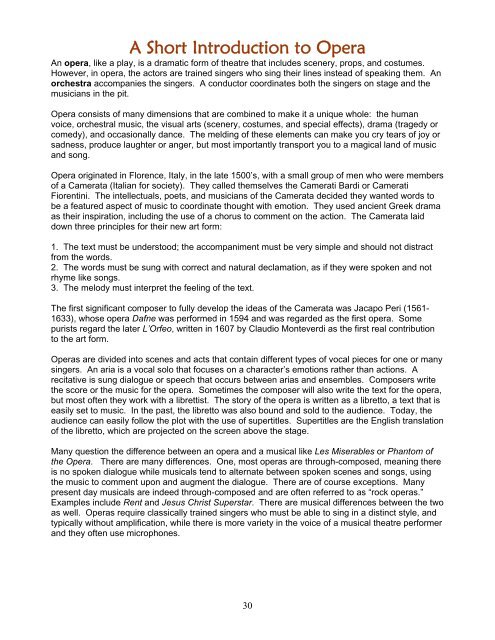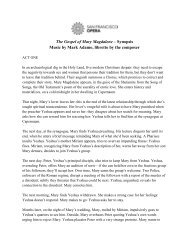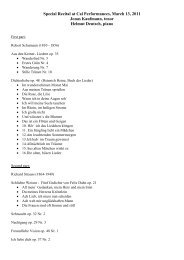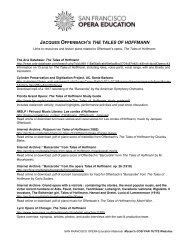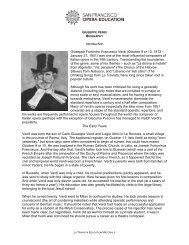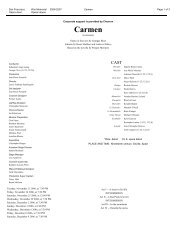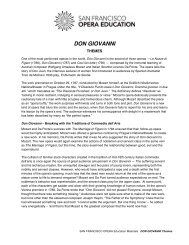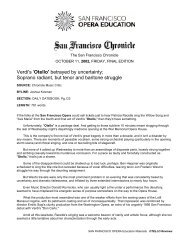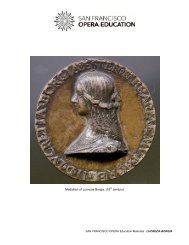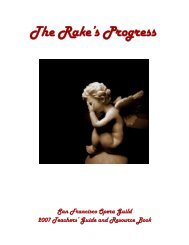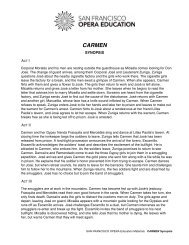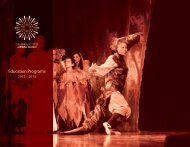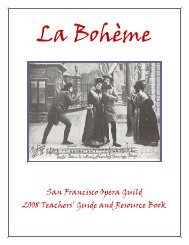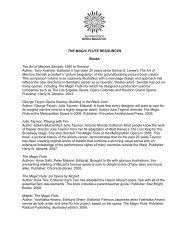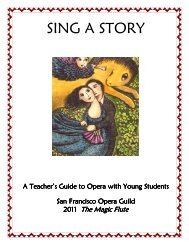Boris Godunov - San Francisco Opera
Boris Godunov - San Francisco Opera
Boris Godunov - San Francisco Opera
You also want an ePaper? Increase the reach of your titles
YUMPU automatically turns print PDFs into web optimized ePapers that Google loves.
A Short Introduction to <strong>Opera</strong><br />
An<br />
opera, like a play, is a dramatic form of theatre that includes scenery, props, and costumes.<br />
However, in opera, the actors are trained singers who sing their lines instead of speaking them. An<br />
orchestra<br />
accompanies the singers. A conductor coordinates both the singers on stage and the<br />
musicians<br />
in the pit.<br />
<strong>Opera</strong><br />
consists of many dimensions that are combined to make it a unique whole: the human<br />
voice, orchestral<br />
music, the visual arts (scenery, costumes, and special effects), drama (tragedy or<br />
comedy),<br />
and occasionally dance. The melding of these elements can make you cry tears of joy or<br />
sadness, produce laughter or anger, but most importantly transport you to a magical land of music<br />
and<br />
song.<br />
<strong>Opera</strong><br />
originated in Florence, Italy, in the late 1500’s, with a small group of men who were members<br />
of<br />
a Camerata (Italian for society). They called themselves the Camerati Bardi or Camerati<br />
Fiorentini.<br />
The intellectuals, poets, and musicians of the Camerata decided they wanted words to<br />
be<br />
a featured aspect of music to coordinate thought with emotion. They used ancient Greek drama<br />
as<br />
their inspiration, including the use of a chorus to comment on the action. The Camerata laid<br />
down<br />
three principles for their new art form:<br />
1.<br />
The text must be understood; the accompaniment must be very simple and should not distract<br />
from<br />
the words.<br />
2.<br />
The words must be sung with correct and natural declamation, as if they were spoken and not<br />
rhyme<br />
like songs.<br />
3. The melody must interpret the feeling of the text.<br />
The first significant composer to fully develop the ideas of the Camerata was Jacapo Peri (1561-<br />
1633), whose opera Dafne was performed in 1594 and was regarded as the first opera. Some<br />
purists<br />
regard the later L’Orfeo, written in 1607 by Claudio Monteverdi as the first real contribution<br />
to the art form.<br />
<strong>Opera</strong>s are divided into scenes and acts that contain different types of vocal pieces for one or many<br />
singers. An aria is a vocal solo that focuses on a character’s emotions rather than actions. A<br />
recitative is sung dialogue or speech that occurs between arias and ensembles. Composers write<br />
the score or the music for the opera. Sometimes the composer will also write the text for the opera,<br />
but most often they work with a librettist. The story of the opera is written as a libretto, a text that is<br />
easily set to music. In the past, the libretto was also bound and sold to the audience. Today, the<br />
audience can easily follow the plot with the use of supertitles. Supertitles are the English translation<br />
of the libretto, which are projected on the screen above the stage.<br />
Many question the difference between an opera and a musical like Les Miserables or Phantom of<br />
the <strong>Opera</strong>. There are many differences. One, most operas are through-composed, meaning there<br />
is no spoken dialogue while musicals tend to alternate between spoken scenes and songs, using<br />
the music to comment upon and augment the dialogue. There are of course exceptions. Many<br />
present day musicals are indeed through-composed and are often referred to as “rock operas.”<br />
Examples include Rent and Jesus Christ Superstar. There are musical differences between the two<br />
as well. <strong>Opera</strong>s require classically trained singers who must be able to sing in a distinct style, and<br />
typically without amplification, while there is more variety in the voice of a musical theatre performer<br />
and they often use microphones.<br />
30


